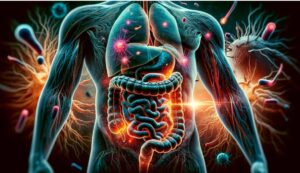Study Finds Artificial Sweetener Can Cause Healthy Gut Bacteria To Become Diseased
- Uncategorized
- No Comment
- 266

Neotame, a new artificial sweetener, harms gut health by damaging bacteria and epithelial cells, raising risks for diseases like sepsis and irritable bowel syndrome.
New research has discovered that neotame, one of the new generation of artificial sweeteners, is capable of damaging the human intestine and causing illness.
The study is the first to show that neotame can cause previously healthy gut bacteria to become diseased and invade the gut wall – potentially leading to health issues including irritable bowel syndrome and sepsis – and also cause a breakdown of the epithelial barrier, which forms part of the gut wall.
The research, which was published today (April 24) in the journal Frontiers in Nutrition and was carried out at Anglia Ruskin University (ARU), demonstrates that neotame can damage the intestinal epithelium directly, by causing the death of epithelial cells, and indirectly, by damaging bacteria commonly found in the gut.
The in vitro study identified a range of pathogenic responses following exposure of E. coli (Escherichia coli) and E. faecalis (Enterococcus faecalis) to neotame, which is found in drinks, foods, and chewing gums, including biofilm formation and increased adhesion to and invasion of cells by diseased bacteria.
Some of the newest artificial sweeteners have a 1,000-fold sweeter taste compared to sugar, reducing the amount needed to be added to food and drink. Despite the smaller quantities used, the impact of neotame on the epithelium-microbiota relationship has the potential to cause poor gut health, which in turn could lead to metabolic and inflammatory diseases such as irritable bowel disease or insulin resistance.
This new research into neotame builds on previous work by Dr. Havovi Chichger of Anglia Ruskin University (ARU), which discovered that saccharin, sucralose, and aspartame, some of the most widely used artificial sweeteners, could cause similar damage in the gut.
Artificial sweeteners can play a role in helping with weight loss and aiding individuals with glucose intolerance and type 2 diabetes. However, this new study, led by Dr. Aparna Shil, of Jahangirnagar University in Bangladesh, and Dr. Chichger highlights the need for further research into the toxic effects of some of the artificial sweeteners that have been developed more recently.
Dr. Chichger, Associate Professor in Biomedical Science at Anglia Ruskin University (ARU) and senior author of the study, said: “There is now growing awareness of the health impacts of sweeteners such as saccharin, sucralose, and aspartame, with our own previous work demonstrating the problems they can cause to the wall of the intestine and the damage to the ‘good bacteria’ which form in our gut.
“This can lead to a range of potential health issues including diarrhea, intestinal inflammation, and even infections such as septicemia if the bacteria were to enter the bloodstream. Therefore, it is important to also study sweeteners that have been introduced more recently and our new research demonstrates that neotame causes similar problems, including gut bacteria becoming diseased.
“Understanding the impact of these pathogenic changes occurring in the gut microbiota is vital. Our findings also demonstrate the need to better understand common food additives more widely and the molecular mechanisms underlying potential negative health impacts.”
Study Finds Artificial Sweetener Can Cause Healthy Gut Bacteria To Become Diseased





